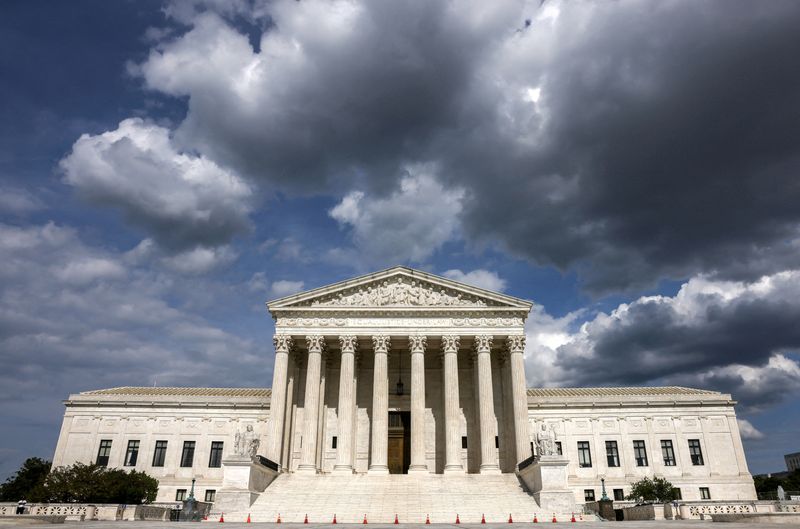By Lawrence Hurley and Andrew Chung
WASHINGTON (Reuters) - The U.S. Supreme Court on Thursday blocked President Joe Biden's COVID-19 vaccination-or-testing mandate for large businesses - a policy the conservative justices deemed an improper imposition on the lives and health of many Americans - while endorsing a separate federal vaccine requirement for healthcare facilities.
Biden voiced disappointment with the conservative-majority court's decision to halt his administration's rule requiring vaccines or weekly COVID-19 tests for employees at businesses with at least 100 employees. Biden said it now is up to states and employers to decide whether to require workers "to take the simple and effective step of getting vaccinated."
The court was divided in both cases, centering on pandemic-related federal regulations at a time of escalating coronavirus infections driven by the Omicron variant in a nation that leads the world with more than 845,000 COVID-19 deaths.
It ruled 6-3, with the six conservative justices in the majority and three liberal justices dissenting, in blocking the rule involving large businesses - a policy that applied to more than 80 million employees. The court's majority downplayed the risk COVID-19 specifically poses in the workplace, comparing it instead to "day-to-day" crime and pollution hazards that individuals face everywhere.
The vote was 5-4 to allow the healthcare worker rule, which requires vaccination for about 10.3 million workers at 76,000 healthcare facilities including hospitals and nursing homes that accept money from the Medicare and Medicaid government health insurance programs for elderly, disabled and low-income Americans. Two conservatives, Chief Justice John Roberts and Justice Brett Kavanaugh, joined the liberals in the majority in that case.
In a statement, Biden said the court's decision allowing the healthcare worker mandate "will save lives" and his administration will enforce it. Workers must be vaccinated by the end of February.
The court heard arguments last Friday in the legal fight over temporary mandates issued in November by two federal agencies aimed at increasing U.S. vaccination rates and making workplaces and healthcare settings safer. The cases tested presidential powers to address a swelling public health crisis.
In an unsigned ruling, the court said the rule affecting large businesses, issued by the Occupational Safety and Health Administration (OSHA), was not an ordinary use of federal power.
"It is instead a significant encroachment on the lives - and health - of a vast number of employees," the court said.
"Permitting OSHA to regulate the hazards of daily life -simply because most Americans have jobs and face those same risks while on the clock - would significantly expand OSHA's regulatory authority without clear congressional authorization," the court added.
Challengers led by the state of Ohio and the National Federation of Independent Business (NFIB), which represents employers, asked the justices to block OSHA's rule after a lower court lifted an injunction against it. Companies were supposed to start showing they were in compliance starting this past Monday.
In dissent, Justice Stephen Breyer wrote on behalf of the liberal justices that the decision "stymies the federal government's ability to counter the unparalleled threat that COVID-19 poses to our nation's workers."
'WELCOME RELIEF'
"Today's decision is welcome relief for America's small businesses, who are still trying to get their business back on track since the beginning of the pandemic," said Karen Harned, executive director of the NFIB's legal arm.
The high court blocked a Dec. 17 decision by the Cincinnati-based 6th U.S. Circuit Court of Appeals that had allowed the mandate to go into effect.
In the healthcare facilities case, the court's differently comprised majority concluded that the regulation "fits neatly" within the power Congress conferred on the government to impose conditions on Medicaid and Medicare funds, which includes policies that protect health and safety.
"After all, ensuring that providers take steps to avoid transmitting a dangerous virus to their patients is consistent with the fundamental principle of the medical profession: first, do no harm," the court said.
Four conservative justices dissented from the healthcare facility decision, concluding that Congress had not given the federal agency the authority to require vaccinations for millions of healthcare workers. In one dissent, Justice Samuel Alito doubted that the agency can "put more than 10 million healthcare workers to the choice of their jobs or an irreversible medical treatment."
The justices lifted orders by federal judges in Missouri and Louisiana blocking the policy in 24 states, allowing the administration to enforce it nearly nationwide. Enforcement was blocked in Texas by a lower court in separate litigation not at issue before the Supreme Court.

Gerald Harmon, president of the American Medical Association physicians group, said that although he is pleased the court allowed the healthcare worker mandate, the broader workplace rule is also needed.
"Workplace transmission has been a major factor in the spread of COVID-19," Harmon added. "Now more than ever, workers in all settings across the country need commonsense, evidence-based protections against COVID-19 infection, hospitalization and death."